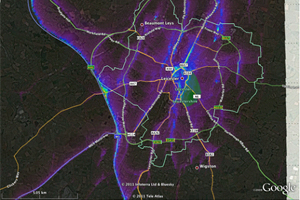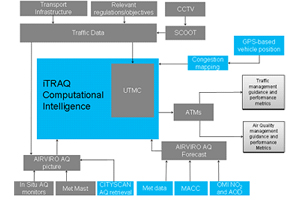ITRAQ
Integrated Traffic Management and Air Quality Control Using Space Services (iTRAQ)
Background
iTRAQ is a project to develop a dynamic traffic management system for optimising use of the road network whilst meeting growing demands to sustain high standards of air quality in urban environments. Stage one of the project is a one year feasibility study to develop a system concept around an existing operational traffic control system in use in the City of Leicester, augmented with traffic flow and air quality information and near real-time data from space and in situ measurements. For stage two a demonstration activity is planned.
Problem
Operational priorities for iTRAQ are to mitigate traffic congestion, improve delivery from public transportation networks and improve air quality. These priorities are driven by local, national and European level policy in the areas of air quality, local transport and climate. Not only will the project aim to improve existing management in these areas, but will provide evidence to support regulatory reporting and enable a valuable assessment of current and future policy to take place.
In the current era of austerity, maximising the return in all parts of a local authority’s responsibilities is welcome and this project aims to work with the users to cover as many different aspects as possible.
Target Users
The target market is anticipated to be local authorities of medium to large towns (typically >200,000 people). In the iTRAQ feasibility study the user is Leicester City Council in the UK, however surrounding local authorities which cover both nearby towns and the adjacent rural areas are being invited to oversee this project and encouraged to participate in the planned follow-on Demonstration Activity.

The Leicester road network, overlaid with air quality data produced by the AirViro model. The region of interest for the iTRAQ pilot study is shown in green.

Machine Learning
The system will consist of 2 Machine Learning components:
- a traffic and pollution optimizer (GA)
- a pollution forecast (NN).
The system will require current and historical traffic data and pollution levels associated with the traffic data.
Contact
For further information please contact David Elizondo elizondo@dmu.ac.uk